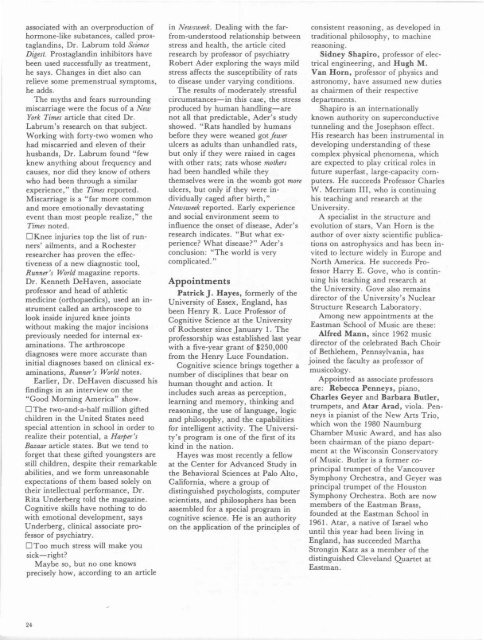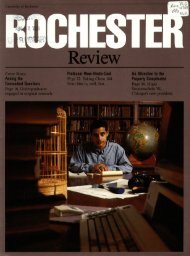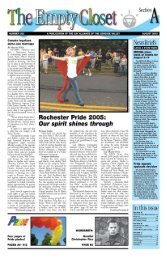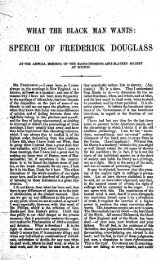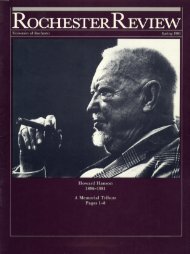Download PDF - University of Rochester Libraries
Download PDF - University of Rochester Libraries
Download PDF - University of Rochester Libraries
Create successful ePaper yourself
Turn your PDF publications into a flip-book with our unique Google optimized e-Paper software.
associated with an overproduction <strong>of</strong><br />
hormone-like substances, called prostaglandins,<br />
Dr. Labrum told Science<br />
Digest. Prostaglandin inhibitors have<br />
been used successfully as treatment,<br />
he says. Changes in diet also can<br />
relieve some premenstrual symptoms,<br />
he adds.<br />
The myths and fears surrounding<br />
miscarriage were the focus <strong>of</strong> a New<br />
York Times article that cited Dr.<br />
Labrum's research on that subject.<br />
Working with forty-two women who<br />
had miscarried and eleven <strong>of</strong> their<br />
husbands, Dr. Labrum found "few<br />
knew anything about frequency and<br />
causes, nor did they know <strong>of</strong> others<br />
who had been through a similar<br />
experience," the Times reported.<br />
Miscarriage is a "far more common<br />
and more emotionally devastating<br />
event than most people realize," the<br />
Times noted.<br />
DKnee injuries top the list <strong>of</strong> runners'<br />
ailments, and a <strong>Rochester</strong><br />
researcher has proven the effectiveness<br />
<strong>of</strong> a new diagnostic tool,<br />
Runner's World magazine reports.<br />
Dr. Kenneth DeHaven, associate<br />
pr<strong>of</strong>essor and head <strong>of</strong> athletic<br />
medicine (orthopaedics), used an instrument<br />
called an arthroscope to<br />
look inside injured knee joints<br />
without making the major incisions<br />
previously needed for internal examinations.<br />
The arthroscope<br />
diagnoses were more accurate than<br />
initial diagnoses based on clinical examinations,<br />
Runner's World notes.<br />
Earlier, Dr. DeHaven discussed his<br />
findings in an interview on the<br />
"Good Morning America" show.<br />
DThe two-and-a-half million gifted<br />
children in the United States need<br />
special attention in school in order to<br />
realize their potential, a Harper's<br />
Bazaar article states. But we tend to<br />
forget that these gifted youngsters are<br />
still children, despite their remarkable<br />
abilities, and we form unreasonable<br />
expectations <strong>of</strong> them based solely on<br />
their intellectual performance, Dr.<br />
Rita Underberg told the magazine.<br />
Cognitive skills have nothing to do<br />
with emotional development, says<br />
Underberg, clinical associate pr<strong>of</strong>essor<br />
<strong>of</strong> psychiatry.<br />
DToo much stress will make you<br />
sick-right?<br />
Maybe so, but no one knows<br />
precisely how, according to an article<br />
in Newsweek. Dealing with the farfrom-understood<br />
relationship between<br />
stress and health, the article cited<br />
research by pr<strong>of</strong>essor <strong>of</strong> psychiatry<br />
Robert Ader exploring the ways mild<br />
stress affects the susceptibility <strong>of</strong> rats<br />
to disease under varying conditions.<br />
The results <strong>of</strong> moderately stressful<br />
circumstances-in this case, the stress<br />
produced by human handling-are<br />
not all that predictable, Ader's study<br />
showed. "Rats handled by humans<br />
before they were weaned got fewer<br />
ulcers as adults than unhandled rats,<br />
but only if they were raised in cages<br />
with other rats; rats whose mothers<br />
had been handled while they<br />
themselves were in the womb got more<br />
ulcers, but only if they were individually<br />
caged after birth, "<br />
Newsweek reported. Early experience<br />
and social environment seem to<br />
influence the onset <strong>of</strong> disease, Ader's<br />
research indicates. "But what experience?<br />
What disease?" Ader's<br />
conclusion: "The world is very<br />
complicated. "<br />
Appointments<br />
PatrickJ. Hayes, formerly <strong>of</strong> the<br />
<strong>University</strong> <strong>of</strong> Essex, England, has<br />
been Henry R. Luce Pr<strong>of</strong>essor <strong>of</strong><br />
Cognitive Science at the <strong>University</strong><br />
<strong>of</strong> <strong>Rochester</strong> since January 1. The<br />
pr<strong>of</strong>essorship was established last year<br />
with a five-year grant <strong>of</strong> $250,000<br />
from the Henry Luce Foundation.<br />
Cognitive science brings together a<br />
number <strong>of</strong> disciplines that bear on<br />
human thought and action. It<br />
includes such areas as perception,<br />
learning and memory, thinking and<br />
reasoning, the use <strong>of</strong> language, logic<br />
and philosophy, and the capabilities<br />
for intelligent activity. The <strong>University</strong>'s<br />
program is one <strong>of</strong> the first <strong>of</strong> its<br />
kind in the nation.<br />
Hayes was most recently a fellow<br />
at the Center for Advanced Study in<br />
the Behavioral Sciences at Palo Alto,<br />
California, where a group <strong>of</strong><br />
distinguished psychologists, computer<br />
scientists, and philosophers has been<br />
assembled for a special program in<br />
cognitive science. He is an authority<br />
on the application <strong>of</strong> the principles <strong>of</strong><br />
consistent reasoning, as developed in<br />
traditional philosophy, to machine<br />
reasoning.<br />
Sidney Shapiro, pr<strong>of</strong>essor <strong>of</strong> electrical<br />
engineering, and Hugh M.<br />
Van Horn, pr<strong>of</strong>essor <strong>of</strong> physics and<br />
astronomy, have assumed new duties<br />
as chairmen <strong>of</strong> their respective<br />
departments.<br />
Shapiro is an internationally<br />
known authority on superconductive<br />
tunneling and the Josephson effect.<br />
His research has been instrumental in<br />
developing understanding <strong>of</strong> these<br />
complex physical phenomena, which<br />
are expected to play critical roles in<br />
future superfast, large-capacity computers.<br />
He succeeds Pr<strong>of</strong>essor Charles<br />
W. Merriam III, who is continuing<br />
his teaching and research at the<br />
<strong>University</strong>.<br />
A specialist in the structure and<br />
evolution <strong>of</strong> stars, Van Horn is the<br />
author <strong>of</strong> over sixty scientific publications<br />
on astrophysics and has been invited<br />
to lecture widely in Europe and<br />
North America. He succeeds Pr<strong>of</strong>essor<br />
Harry E. Gove, who is continuing<br />
his teaching and research at<br />
the <strong>University</strong>. Gove also remains<br />
director <strong>of</strong> the <strong>University</strong>'s Nuclear<br />
Structure Research Laboratory.<br />
Among new appointments at the<br />
Eastman School <strong>of</strong> Music are these:<br />
Alfred Mann, since 1962 music<br />
director <strong>of</strong> the celebrated Bach Choir<br />
<strong>of</strong> Bethlehem, Pennsylvania, has<br />
joined the faculty as pr<strong>of</strong>essor <strong>of</strong><br />
musicology.<br />
Appointed as associate pr<strong>of</strong>essors<br />
are: Rebecca Penneys, piano,<br />
Charles Geyer and Barbara Butler,<br />
trumpets, and Atar Arad, viola. Penneys<br />
is pianist <strong>of</strong> the New Arts Trio,<br />
which won the 1980 Naumburg<br />
Chamber Music Award, and has also<br />
been chairman <strong>of</strong> the piano department<br />
at the Wisconsin Conservatory<br />
<strong>of</strong> Music. Butler is a former coprincipal<br />
trumpet <strong>of</strong> the Vancouver<br />
Symphony Orchestra, and Geyer was<br />
principal trumpet <strong>of</strong> the Houston<br />
Symphony Orchestra. Both are now<br />
members <strong>of</strong> the Eastman Brass,<br />
founded at the Eastman School in<br />
1961. Atar, a native <strong>of</strong> Israel who<br />
until this year had been living in<br />
England, has succeeded Martha<br />
Strongin Katz as a member <strong>of</strong> the<br />
distinguished Cleveland Quartet at<br />
Eastman.


